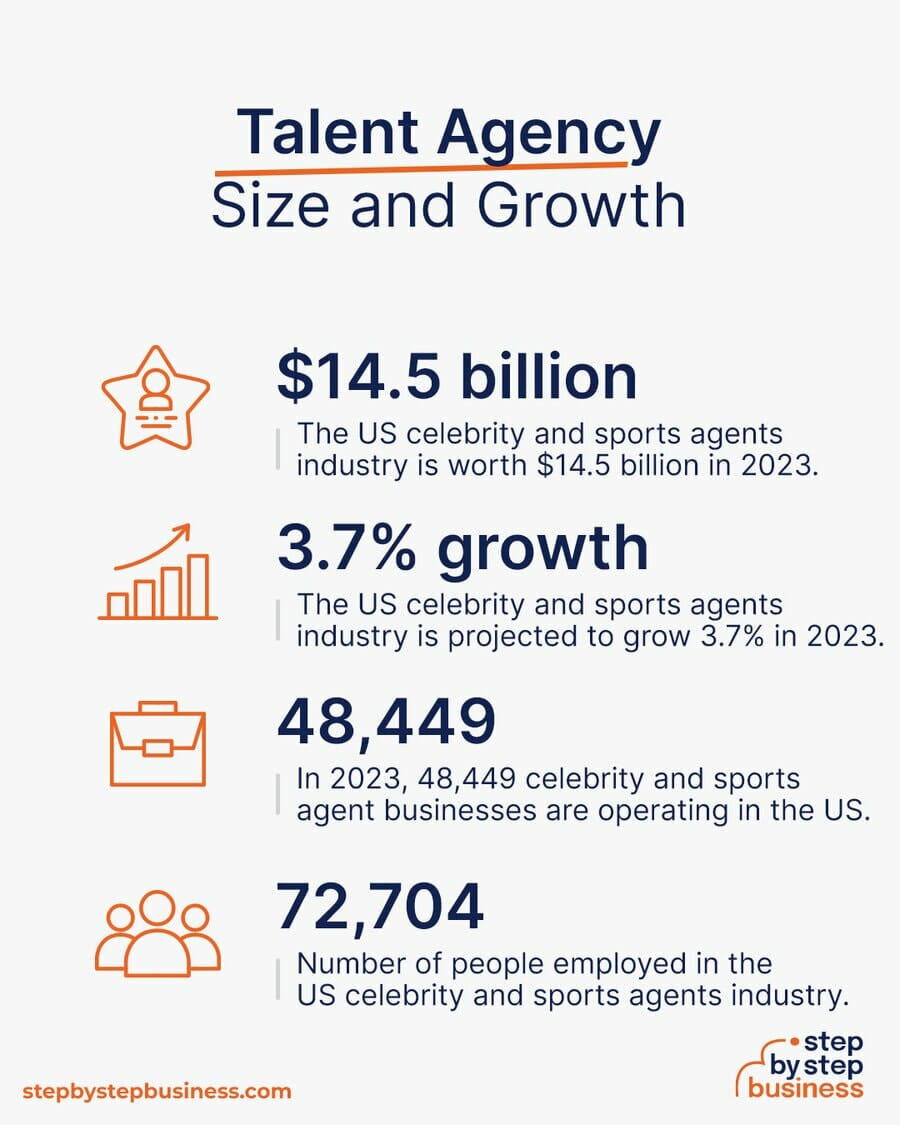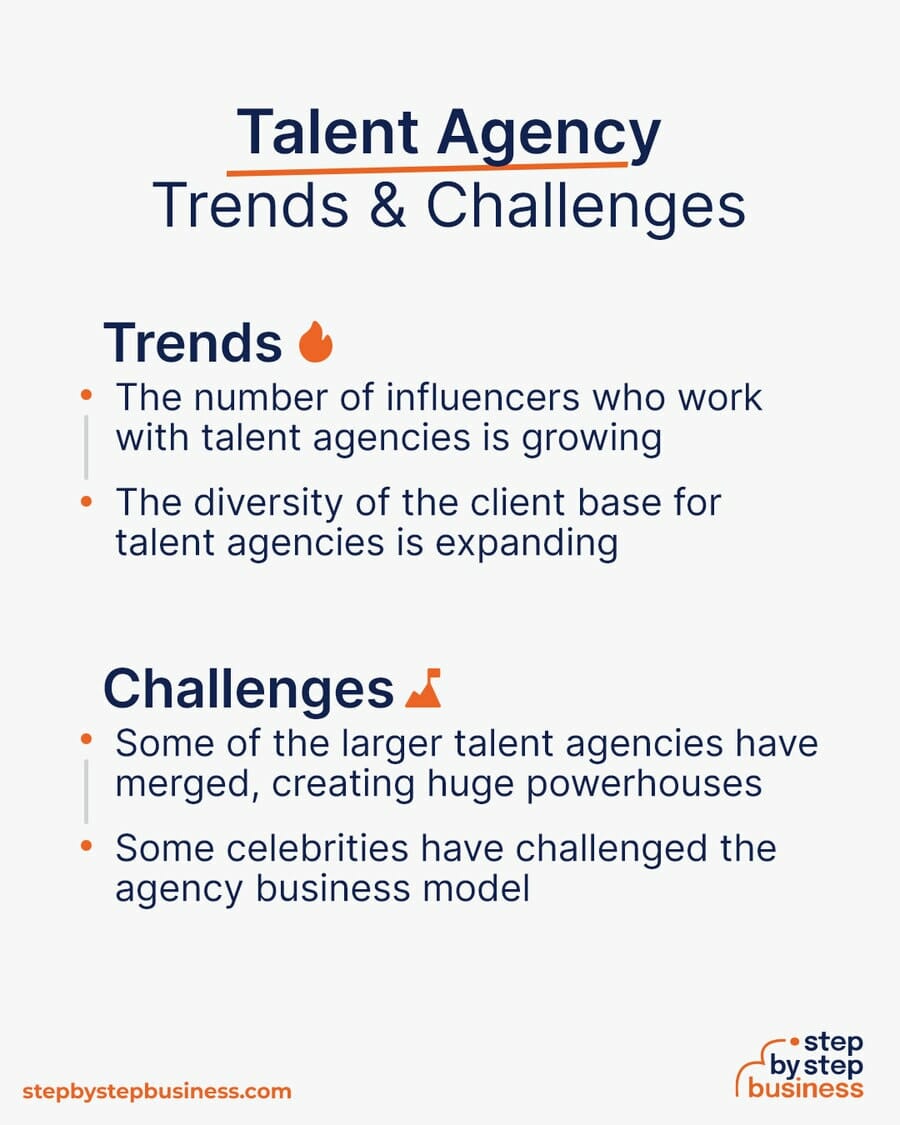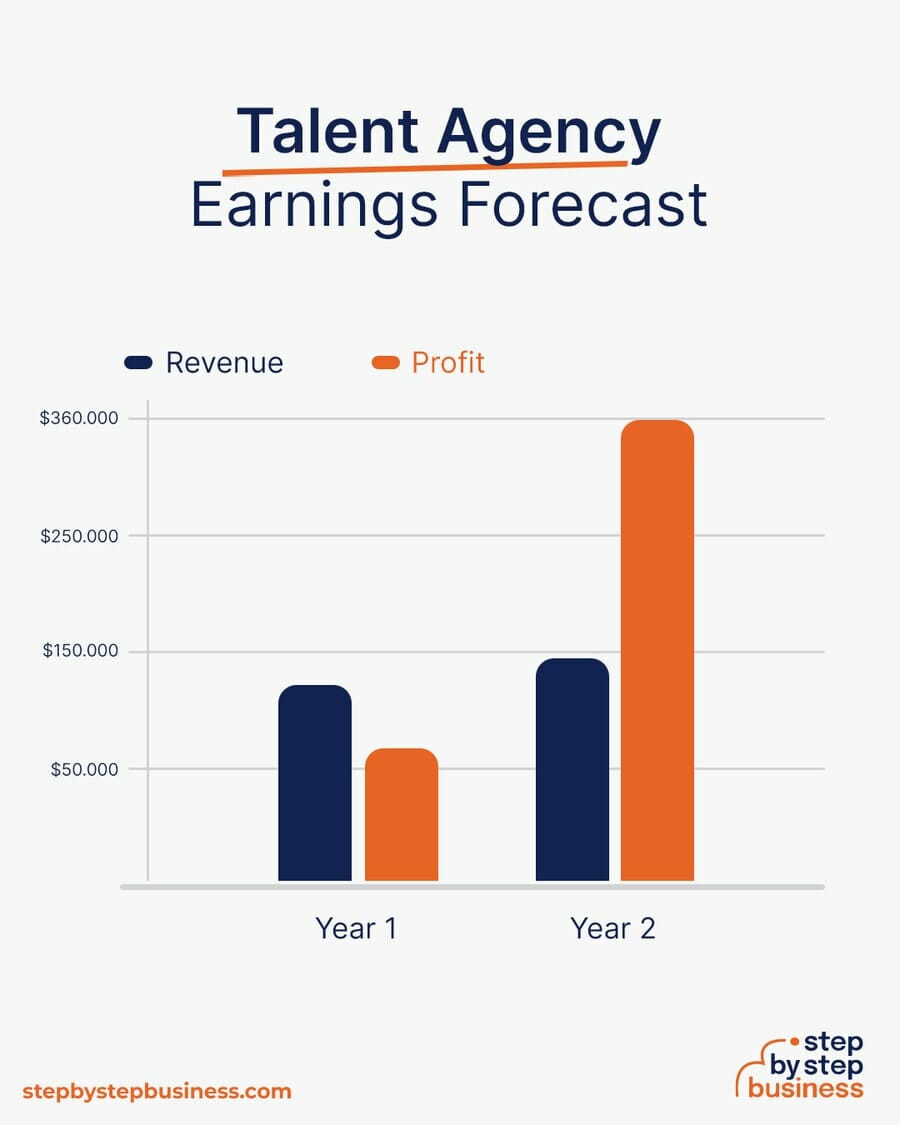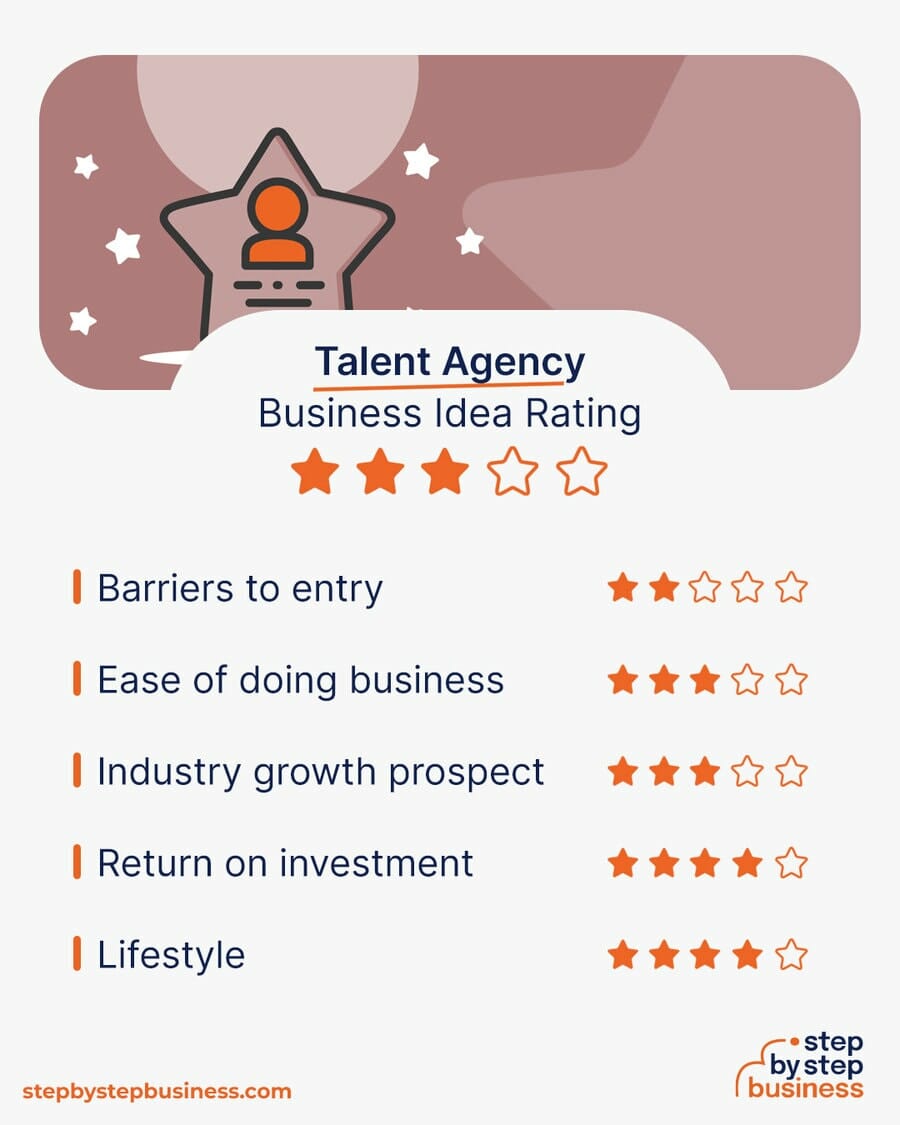Dreaming of running your own agency? There are a lot of possibilities out there, from travel to advertising and marketing, to recruiting, SEOconsult ...
You might consider targeting a niche, such as voice actors.
We earn commissions if you shop through the links below. Read more
Written by: Carolyn Young
Carolyn Young is a business writer who focuses on entrepreneurial concepts and the business formation. She has over 25 years of experience in business roles, and has authored several entrepreneurship textbooks.
Edited by: David Lepeska
David has been writing and learning about business, finance and globalization for a quarter-century, starting with a small New York consulting firm in the 1990s.
Published on May 10, 2023
Updated on July 3, 2024

Investment range
$6,800 - $14,300
Revenue potential
$96,000 - $360,000 p.a.
Time to build
3-6 months
Profit potential
$67,200 - $144,000 p.a.
Industry trend
Growing
Commitment
Full-time
Talent agencies serve an important purpose, helping to build the careers of artists of various kinds as well as athletes. They help their clients with training and exposure, getting auditions, and booking gigs. If you’re looking to get into the talent industry, starting a talent agency could be a great way to do so.
Talent agencies can make a lot of money when their clients are successful, making the celebrity and sports agents industry worth $15 billion in the U.S. alone. You’d also get the rewards of helping your clients achieve success.
But before you start scouting for talent, you’ll need to understand the business. Fortunately, this step-by-step guide details all the information you’ll need to start a successful talent agency.
Looking to register your business? A limited liability company (LLC) is the best legal structure for new businesses because it is fast and simple.
Form your business immediately using ZenBusiness LLC formation service or hire one of the Best LLC Services.



Trends
Challenges
Startup costs for a talent agency range from $7,000 to $14,000. Costs include a marketing budget, both to market your agency and your clients, and legal fees for client contracts. The costs assume that you’ll start by running your business from home.
| Start-up Costs | Ballpark Range | Average |
|---|---|---|
| Setting up a business name and corporation | $100 - $500 | $300 |
| Business licenses and permits | $100 - $300 | $200 |
| Insurance | $100-$500 | $300 |
| Website | $500 - $1,000 | $750 |
| Marketing budget | $5,000 - $10,000 | $7,500 |
| Legal Fees | $1,000 - $2,000 | $1,500 |
| Total | $6,800 - $14,300 | $10,550 |

You’ll charge your client a commission on their earnings, which generally is 10%. Your profit margin should be about 70%.
In your first year or two, you could work from home and book client jobs that bring in $8,000 on average per month, bringing in $96,000 in revenue. This would mean $67,200 in profit, assuming that 70% margin.
As you gain traction, you might have an office and hire staff, reducing your margin to around 40%. Your bookings could climb to $30,000 average per month. With annual revenue of $360,000, you’d make a tidy profit of $144,000.
There are a few barriers to entry for a talent agency. Your biggest challenges will be:

Now that you know what’s involved in starting a talent agency, it’s a good idea to hone your concept in preparation to enter a competitive market.
Market research could give you the upper hand even if you’ve got the perfect product. Conducting robust market research is crucial, as it will help you better understand your customers, your competitors, and the broader business landscape.
Research talent agencies in your area to examine their services, price points, and customer reviews.
You’re looking for a market gap to fill. For instance, maybe the local market is missing a modeling agency, or an agency that represents child actors.
You might consider targeting a niche, such as voice actors.
This could jumpstart your word-of-mouth marketing and attract clients right away.
Your services will involve helping your clients build a portfolio, marketing them, getting them auditions, and negotiating their contracts. You could decide on a niche, such as building acting careers, or sports talent management, or you could represent a range of clients.
The standard rate for talent agencies is 10% of client earnings but can go up to 20%.
Your target market will depend on the niche you choose, but in any case, TikTok and Instagram are good places to market and to find talent.
In the early stages, you may want to run your business from home to keep costs low. But as your business grows, you’ll likely need to hire workers for various roles and may need to rent out an office. You can find commercial space to rent in your area on sites such as Craigslist, Crexi, and Instant Offices.
When choosing a commercial space, you may want to follow these rules of thumb:


Here are some ideas for brainstorming your business name:
Once you’ve got a list of potential names, visit the website of the US Patent and Trademark Office to make sure they are available for registration and check the availability of related domain names using our Domain Name Search tool. Using “.com” or “.org” sharply increases credibility, so it’s best to focus on these.
Finally, make your choice among the names that pass this screening and go ahead and reserve your business name with your state, start the trademark registration process, and complete your domain registration and social media account creation.
Your business name is one of the key differentiators that sets your business apart. Once you pick a name, reserve it and start with the branding, it’s hard to switch to a new name. So be sure to carefully consider your choice before moving forward.
Here are the key components of a business plan:

If you’ve never created a business plan, it can be an intimidating task. You might consider hiring a business plan specialist to create a top-notch business plan for you.
Registering your business is an absolutely crucial step — it’s the prerequisite to paying taxes, raising capital, opening a bank account, and other guideposts on the road to getting a business up and running.
Plus, registration is exciting because it makes the entire process official. Once it’s complete, you’ll have your own business!
Your business location is important because it can affect taxes, legal requirements, and revenue. Most people will register their business in the state where they live, but if you are planning to expand, you might consider looking elsewhere, as some states could offer real advantages when it comes to talent agencies.
If you’re willing to move, you could really maximize your business! Keep in mind, it’s relatively easy to transfer your business to another state.
Business entities come in several varieties, each with its pros and cons. The legal structure you choose for your talent agency will shape your taxes, personal liability, and business registration requirements, so choose wisely.
Here are the main options:

We recommend that new business owners choose LLC as it offers liability protection and pass-through taxation while being simpler to form than a corporation. You can form an LLC in as little as five minutes using an online LLC formation service. They will check that your business name is available before filing, submit your articles of organization, and answer any questions you might have.
Choose Your State
The final step before you’re able to pay taxes is getting an Employer Identification Number, or EIN. You can file for your EIN online or by mail or fax: visit the IRS website to learn more. Keep in mind, if you’ve chosen to be a sole proprietorship you can simply use your social security number as your EIN.
Once you have your EIN, you’ll need to choose your tax year. Financially speaking, your business will operate in a calendar year (January–December) or a fiscal year, a 12-month period that can start in any month. This will determine your tax cycle, while your business structure will determine which taxes you’ll pay.
The IRS website also offers a tax-payers checklist, and taxes can be filed online.
It is important to consult an accountant or other professional to help you with your taxes to ensure you are completing them correctly.
Securing financing is your next step and there are plenty of ways to raise capital:

Bank and SBA loans are probably the best option, other than friends and family, for funding a talent agency business. You might also try crowdfunding if you have an innovative concept.

Starting a talent agency business requires obtaining a number of licenses and permits from local, state, and federal governments.
Some states require that you become a licensed talent agent and you may also have to get a surety bond. Check with your state for requirements.
Federal regulations, licenses, and permits associated with starting your business include doing business as (DBA), health licenses and permits from the Occupational Safety and Health Administration (OSHA), trademarks, copyrights, patents, and other intellectual properties, as well as industry-specific licenses and permits.
You may also need state-level and local county or city-based licenses and permits. The license requirements and how to obtain them vary, so check the websites of your state, city, and county governments or contact the appropriate person to learn more.
You could also check this SBA guide for your state’s requirements, but we recommend using MyCorporation’s Business License Compliance Package. They will research the exact forms you need for your business and state and provide them to ensure you’re fully compliant.
This is not a step to be taken lightly, as failing to comply with legal requirements can result in hefty penalties.
If you feel overwhelmed by this step or don’t know how to begin, it might be a good idea to hire a professional to help you check all the legal boxes.
Before you start making money, you’ll need a place to keep it, and that requires opening a bank account.
Keeping your business finances separate from your personal account makes it easy to file taxes and track your company’s income, so it’s worth doing even if you’re running your talent agency business as a sole proprietorship. Opening a business bank account is quite simple, and similar to opening a personal one. Most major banks offer accounts tailored for businesses — just inquire at your preferred bank to learn about their rates and features.
Banks vary in terms of offerings, so it’s a good idea to examine your options and select the best plan for you. Once you choose your bank, bring in your EIN (or Social Security Number if you decide on a sole proprietorship), articles of incorporation, and other legal documents and open your new account.
Business insurance is an area that often gets overlooked yet it can be vital to your success as an entrepreneur. Insurance protects you from unexpected events that can have a devastating impact on your business.
Here are some types of insurance to consider:


As opening day nears, prepare for launch by reviewing and improving some key elements of your business.
Being an entrepreneur often means wearing many hats, from marketing to sales to accounting, which can be overwhelming. Fortunately, many websites and digital tools are available to help simplify many business tasks.
You may want to use industry-specific software, such as Skybolt, or staragent, to manage your clients, workflows, and billing.
Website development is crucial because your site is your online presence and needs to convince prospective clients of your expertise and professionalism. You can create your own website using services like WordPress, Wix, or Squarespace. This route is very affordable, but figuring out how to build a website can be time-consuming. If you lack tech-savvy, you can hire a web designer or developer to create a custom website for your business.
Your customers are unlikely to find your website, however, unless you follow Search Engine Optimization (SEO) practices. SEO will help your website appear closer to the top in relevant search results, a crucial element for increasing sales.
Make sure that you optimize calls to action on your website. Experiment with text, color, size, and position of calls to action such as “Schedule Consultation Now”. This can sharply increase purchases.
Here are some powerful marketing strategies for your future business:

Unique selling propositions, or USPs, are the characteristics of a product or service that sets it apart from the competition. Customers today are inundated with buying options, so you’ll have a real advantage if they are able to quickly grasp how your talent agency meets their needs or wishes. It’s wise to do all you can to ensure your USPs stand out on your website and in your marketing and promotional materials, stimulating buyer desire.
Global pizza chain Domino’s is renowned for its USP: “Hot pizza in 30 minutes or less, guaranteed.” Signature USPs for your talent agency business could be:
You may not like to network or use personal connections for business gain. But your personal and professional networks likely offer considerable untapped business potential. Maybe that Facebook friend you met in college is now running a talent agency business, or a LinkedIn contact of yours is connected to dozens of potential clients. Maybe your cousin or neighbor has been working in talent agencies for years and can offer invaluable insight and industry connections.
The possibilities are endless, so it’s a good idea to review your personal and professional networks and reach out to those with possible links to or interest in talent agencies. You’ll probably generate new customers or find companies with which you could establish a partnership.

If you’re starting out small from a home office, you may not need any employees. But as your business grows, you will likely need workers to fill various roles. Potential positions for a talent agency business include:
At some point, you may need to hire all of these positions or simply a few, depending on the size and needs of your business. You might also hire multiple workers for a single role or a single worker for multiple roles, again depending on need.
Free-of-charge methods to recruit employees include posting ads on popular platforms such as LinkedIn, Facebook, or Jobs.com. You might also consider a premium recruitment option, such as advertising on Indeed, Glassdoor, or ZipRecruiter. Further, if you have the resources, you could consider hiring a recruitment agency to help you find talent.

Owning a talent agency can be a very rewarding pursuit as you help your clients build their careers, whether in acting, modeling, or sports. You’ll also become part of a $15 billion industry and make a healthy living. There’s no limit to how large you can grow your agency, whether you’re in Los Angeles or a city in the Midwest.
You understand the business now, so you’re ready to hit the pavement and get your successful talent agency started!
A talent agency can be profitable if managed efficiently and successfully. The profitability of a talent agency depends on factors such as the size of the agency, the clients it represents, the commission rates charged, and the ability to attract and retain high-profile talent.
A typical day at a talent agency may involve various activities such as scouting new talent, negotiating contracts and deals, organizing auditions or casting sessions, communicating with clients and industry professionals, and managing the careers of the talent represented by the agency.
The growth potential of a talent agency can be significant, depending on the agency’s ability to build a strong reputation, attract high-profile clients, and expand its services and reach. As the entertainment industry evolves and new platforms emerge, there may be opportunities for talent agencies to diversify their offerings and leverage digital tools to reach a wider audience.
A talent agency is a service-based business that represents and manages the careers of actors, models, musicians, athletes, or other talented individuals. The business model typically involves earning a commission on the talent’s earnings, usually ranging from 10-20%, for services such as securing contracts, negotiating deals, managing public relations, and booking gigs.

Published on August 11, 2022
Dreaming of running your own agency? There are a lot of possibilities out there, from travel to advertising and marketing, to recruiting, SEOconsult ...
Read Now

Published on July 12, 2022
Are you updated with the latest fashion trends? If so, then starting a clothing business would be a perfect career choice for you. You may open abou ...
Read Now

Published on June 30, 2022
Want to express your creativity and be your own boss? There are many creative business ideas out there that can help you check both boxes, and makeg ...
Read Now
No thanks, I don't want to stay up to date on industry trends and news.
Thanks for the information. My actor friend and I are thinking about starting a Talent agency or Casting director Business.
We both are experience actors, VO, screenwriters and songwriters.